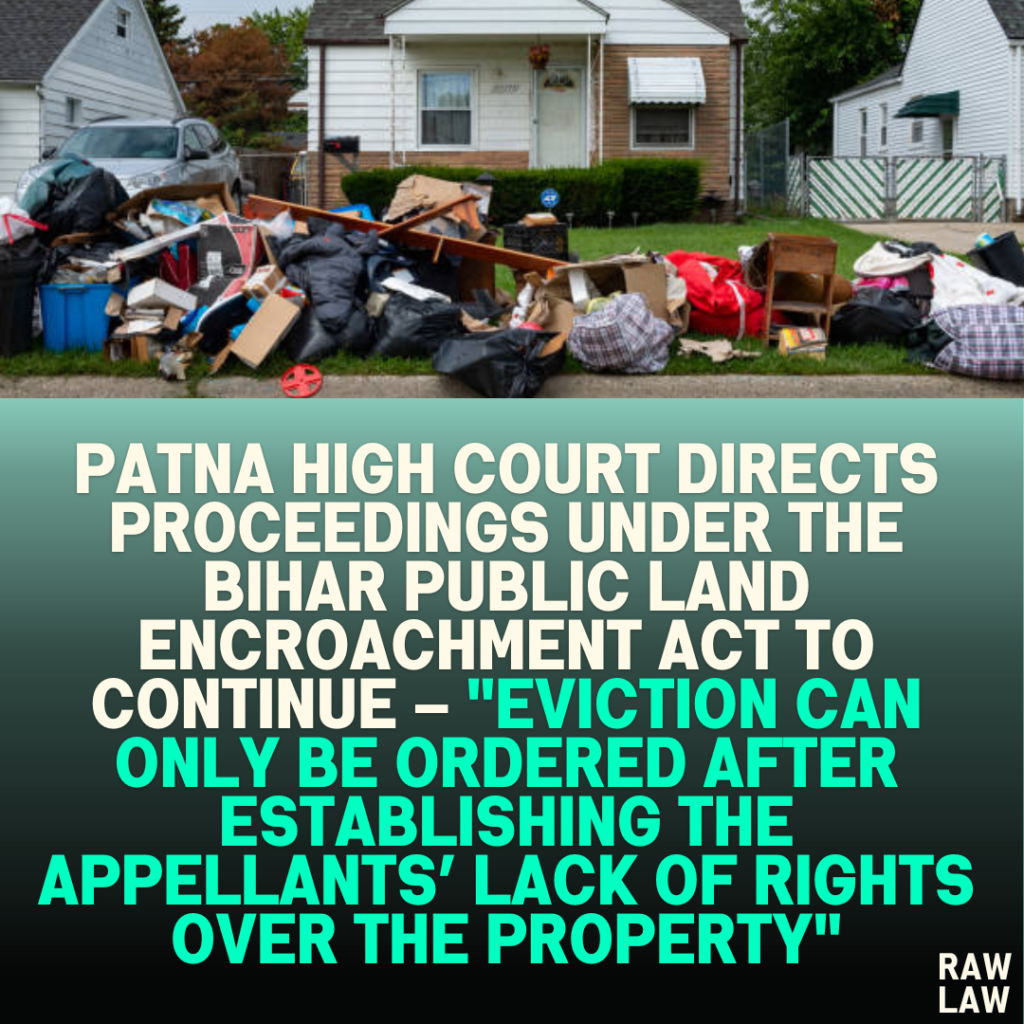Court’s Decision
The Patna High Court dismissed the appeals filed by various appellants challenging the show-cause notices issued under the Bihar Public Land Encroachment Act, 1956, and directed the proceedings to continue. The court held that the appellants must first file objections to the show-cause notices and that their objections would be decided by the appropriate authorities. The court emphasized that eviction can only be ordered after it is determined that the appellants have no rights over the disputed properties.
Facts
The appellants challenged the show-cause notices issued under the Bihar Public Land Encroachment Act, 1956, claiming that they or their predecessors had successfully resisted similar eviction attempts in 1953, 1973, and 2013. They argued that the earlier proceedings had established their right over the land. The show-cause notices were issued in connection with alleged encroachments on land purportedly belonging to the National Highway Authority of India (N.H.A.I.) in Purnea, Bihar. The learned Single Judge had previously refused to interfere, prompting the appellants to file these appeals.
Issues
The primary issues before the court were:
- Whether the appellants could be subjected to a summary proceeding under the Encroachment Act when there were disputed questions of title and possession.
- Whether the doctrine of res judicata applied to bar the current proceedings in light of the earlier orders in favor of the appellants.
Petitioner’s Arguments
The appellants argued that:
- The principle of res judicata barred the current proceedings as the earlier authorities under the Encroachment Act had decided in favor of their predecessors, holding that no summary eviction could be undertaken.
- If there was any dispute over the title of the land, it should be resolved through a civil suit and not by summary proceedings under the Encroachment Act.
- They cited multiple judgments, including Ritlal Chaudhary v. District Magistrate Purnea and M/s Hindusthan Petroleum Corporation v. State of Bihar, asserting that summary proceedings are impermissible if there is a semblance of right or disputed title.
Respondent’s Arguments
The State argued that:
- The appellants were rank encroachers on land belonging to the N.H.A.I., which had been narrowed significantly due to the encroachments.
- The appellants failed to establish a bona fide right over the properties and were not the successors-in-interest of the individuals who allegedly obtained favorable orders in the earlier proceedings.
- They emphasized that the High Court’s extraordinary jurisdiction under Article 226 should not be invoked at the show-cause notice stage, and any grievances should be addressed in the appropriate forum.
Analysis of the Law
The court discussed the principles of res judicata and the permissibility of summary proceedings under the Encroachment Act. The court reiterated that the bar of res judicata would not apply in the absence of proof that the present appellants were successors to the original petitioners in the earlier cases. Further, it emphasized that disputed questions of fact regarding title and possession could not be decided in a summary manner and required detailed examination before the appropriate authority.
Precedent Analysis
The court referenced several precedents, including:
- Ritlal Chaudhary v. District Magistrate Purnea – Held that forcible eviction is impermissible, and eviction can only be carried out following due process of law.
- M/s Hindusthan Petroleum Corporation v. State of Bihar and Amrit Varsha Hindi Dainik v. Bihar State Agriculture Marketing Board – Reinforced that mere possession over long periods, without right, cannot justify summary eviction.
- Gulabchand Chotalal Parikh v. State of Gujarat – Discussed general principles of res judicata.
Court’s Reasoning
The court reasoned that:
- The appellants did not provide sufficient documentary evidence to establish their rights over the properties in question.
- The doctrine of res judicata would not apply unless the appellants proved that they were successors to the parties in the earlier proceedings.
- The mere issuance of show-cause notices does not amount to infringement of rights and can be challenged after the authorities decide on the objections.
Conclusion
The court concluded that the appeals were devoid of merit and upheld the decision of the learned Single Judge to not interfere with the show-cause notices. However, the court directed that the appellants be allowed to file detailed objections to the show-cause notices, and the authorities must conduct separate proceedings for each appellant’s claims. Any eviction should be ordered only after establishing the lack of rights over the properties.
Implications
This decision underscores the limited scope of judicial review at the stage of show-cause notices and emphasizes the need for parties to first exhaust their remedies before the appropriate forums. It reaffirms that summary proceedings under the Encroachment Act cannot be used to settle complex questions of title and possession. Further, the ruling clarifies that eviction can only proceed after a proper adjudication of rights, preventing arbitrary demolitions or dispossession without due process.
